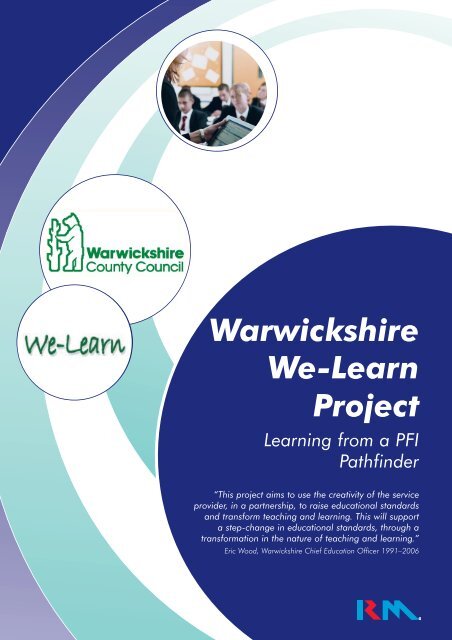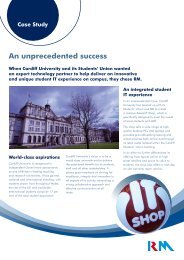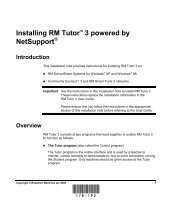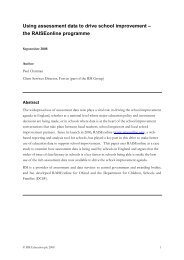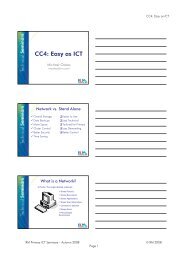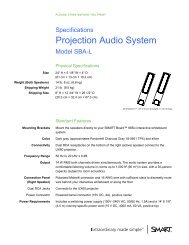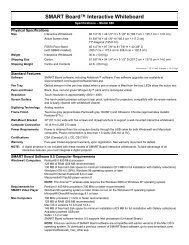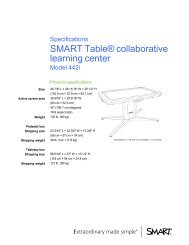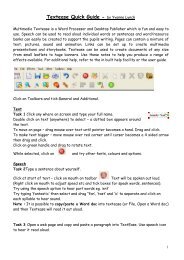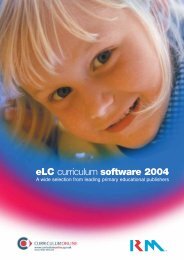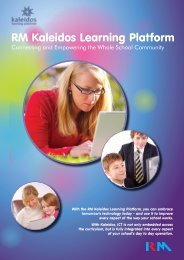Learning from a PFI Pathfinder - RM.com
Learning from a PFI Pathfinder - RM.com
Learning from a PFI Pathfinder - RM.com
You also want an ePaper? Increase the reach of your titles
YUMPU automatically turns print PDFs into web optimized ePapers that Google loves.
R<br />
Warwickshire<br />
We-Learn<br />
Project<br />
<strong>Learning</strong> <strong>from</strong> a <strong>PFI</strong><br />
<strong>Pathfinder</strong><br />
“This project aims to use the creativity of the service<br />
provider, in a partnership, to raise educational standards<br />
and transform teaching and learning. This will support<br />
a step-change in educational standards, through a<br />
transformation in the nature of teaching and learning.”<br />
Eric Wood, Warwickshire Chief Education Officer 1991–2006
What is We-Learn?<br />
The Warwickshire e-<strong>Learning</strong> Community project, known as We-Learn, is one of<br />
four DfES ICT <strong>PFI</strong> <strong>Pathfinder</strong> projects, aimed at raising educational standards<br />
through the innovative application of ICT. The eight-year project, valued at over<br />
£16m, was signed on 31 March 2004 and involves 175 schools across the<br />
county: 139 primary and 36 secondary, engaging 1,800 teachers and 40,500<br />
pupils in 1,490 classrooms.<br />
The project has been fully rolled out on time and within budget and will continue<br />
to evolve over its lifetime, until 2012. This includes a full refresh of equipment.<br />
The project is providing the opportunity to introduce a new approach to teaching,<br />
extending the learning environment beyond the classroom and supporting<br />
teachers to introduce high-quality, digital resources – to enhance lessons and<br />
increase engagement and interactivity with pupils.<br />
Objectives of We-Learn<br />
Raised pupil attainment through:<br />
• supporting teachers’ teaching and pupils’ learning, by focusing on<br />
reducing bureaucracy and workload for teachers and helping to<br />
provide enriched and motivational content and material for pupils.<br />
• raising the quality of teaching and dissemination of good practice<br />
across the county, encouraging collaboration among schools.<br />
• increasing pupils’ motivation and encouraging life-long learning.<br />
• developing a high-quality e-learning service which is sustainable,<br />
innovative and available to all of those involved – 24 hours a day,<br />
365 days a year.<br />
• creating a successful and sustainable teaching and learning model.<br />
With the We-Learn project, the authority is looking to:<br />
• improve <strong>com</strong>munications across the county.<br />
• provide curriculum support to teachers, as and when required.<br />
• deliver consistency of ICT across schools, enabling the provision of<br />
effective ICT support.<br />
• share the risk with the private sector, as a result of the <strong>PFI</strong> funding<br />
route.<br />
• create a successful and sustainable teaching and learning model,<br />
to build on, in the future.<br />
Project monitoring and evaluation<br />
A key part of the We-Learn project is regular monitoring and evaluation,<br />
using feedback to identify areas for improvement. For example, this includes<br />
measuring the confidence and satisfaction of teachers’ use of ICT and<br />
e-learning, plus improvements in attainment at Key Stage 2–4.<br />
Annual attitudinal surveys are carried out among teachers involved in the<br />
project, with the We-Learn solution reporting on <strong>com</strong>munity-wide usage.<br />
Success and achievements<br />
to date<br />
“Our vision is of schools staffed<br />
by confident, trained practitioners,<br />
using classrooms equipped with<br />
dependable, exciting technology – to raise<br />
attainment and encourage positive and<br />
independent attitudes to learning. The legacy<br />
for the future will be improved standards of<br />
achievement, a collaborative and skilled<br />
workforce of teachers and support staff, an<br />
outstanding pool of resources, skills and<br />
knowledge and an appetite for learning.”<br />
John Parmiter,<br />
We-Learn Project Director<br />
In September 2005, the project <strong>com</strong>pleted the full implementation phase – 1,490<br />
teacher toolkits have been implemented in 171 schools across the county (for more<br />
information about the teacher toolkit, see ‘solution at a glance’ on back page).<br />
Target<br />
Actual<br />
Device availability 99% 99.5% average performance<br />
May 05–May 06<br />
School satisfaction 80% of teachers with 88% of teachers reported a “positive attitude<br />
a positive attitude to their e-learning experience” during the<br />
second contract year (based on Oct 2005<br />
annual attitudinal survey)
“I can now spend a<br />
day planning for a whole<br />
half-term’s work, which is<br />
making my life a lot easier. I’m<br />
not worrying about what I’m going<br />
to teach next week. This whole<br />
system is starting to make a<br />
difference to my workload.”<br />
Rachel Buckingham,<br />
Teacher, Bilton School<br />
“In terms of monitoring,<br />
it has already cut down<br />
on my workload. I can look at<br />
everyone’s planning, without<br />
having to go around<br />
collecting files.”<br />
Richard Machin, Deputy Head,<br />
St Michael’s C of E<br />
Primary School<br />
Benefits experienced by<br />
teachers<br />
Saving time<br />
Once teachers are familiar with, and have confidence and <strong>com</strong>petence in using, the<br />
teacher toolkit, there is strong evidence (<strong>from</strong> both primary and secondary schools)<br />
that valuable time has been saved in lesson-planning and preparation.<br />
There is also evidence of school managers saving time when monitoring<br />
lesson-planning. Traditionally, managers have had to ask teachers for details about<br />
lesson-planning activity. Through Kaleidos, the virtual teaching and learning<br />
environment (VTLE), managers can search and find lesson plans automatically, to<br />
assess coverage and quality.<br />
Improving teachers’ collaboration<br />
There is strong evidence <strong>from</strong> several schools of<br />
how the We-Learn solution has encouraged and<br />
developed teachers’ collaboration within schools.<br />
The teacher toolkit and Kaleidos ® have provided<br />
teachers with a consistent way to plan and then<br />
share their lesson plans. This collaboration<br />
shares good practice, is saving teachers’ time and<br />
supporting their professional development.<br />
“We use it (the teacher<br />
toolkit) as a team, each one of us<br />
planning for a year group, then<br />
sharing our lessons using the shared<br />
area in Kaleidos. We have more variety<br />
and learn <strong>from</strong> one another. Because the<br />
children are seeing more variety in their<br />
lessons, they’re more interested and<br />
joining in more.”<br />
Rachel Buckingham,<br />
Teacher, Bilton School<br />
Motivational benefits for pupils<br />
The way in which the teacher toolkits are being used by teachers is having a big<br />
impact on pupils in primary and secondary schools.<br />
Primary pupils are more engaged with their learning, with the Tablet PC allowing all<br />
in a class to be<strong>com</strong>e involved – the interactive content used makes learning appear<br />
to be more fun.<br />
The teacher toolkit allows pupils to demonstrate their achievements; this has<br />
increased pupils’ self-esteem and confidence and is encouraging pupils to be<br />
constructive in giving peer feedback.<br />
Impact on boys<br />
A key benefit of the project has been the motivational impact, an increase in<br />
concentration levels and improved results for boys. The teacher toolkit, used with<br />
interactive software, appeals to the kinesthetic learners and has allowed explanation<br />
and experience of concepts which would otherwise have been very difficult. This has<br />
resulted in boys remaining on task longer.<br />
Improving home-school links<br />
The We-Learn portal is already improving the home-school links for secondary pupils.<br />
Pupils are saving their homework to the portal, accessing it at home on their home<br />
<strong>com</strong>puters and, in many cases, now involving parents or siblings in their homework<br />
activities online.
<strong>Learning</strong> and sharing experiences<br />
<strong>from</strong> We-Learn<br />
<strong>Pathfinder</strong> projects, by their nature, are innovative and ground-breaking; so, inevitably, there are<br />
few similar projects <strong>from</strong> which experience can be taken and lessons shared. As the project<br />
director of one of four DfES ICT <strong>PFI</strong> <strong>Pathfinder</strong> projects, John Parmiter is keen to share the<br />
experience of We-Learn to help and assist other authorities in embarking on projects of this<br />
scale.<br />
The two main lessons learnt are:<br />
1. Change management – the speed of implementation and the change of<br />
teaching practice within schools.<br />
We underestimated the need to engage with teachers and give them the full<br />
vision of where they would be in 18 months to two years’ time.<br />
2. Diverse confidence of teachers – engaging with teachers who are at<br />
different stages in their confidence, ability and <strong>com</strong>petence in using ICT.<br />
“For some teachers, technology was already embedded in their teaching<br />
practice before the start of the We-Learn project; for others, this was not<br />
the case. Some of the more difficult times have been when teachers have<br />
struggled with the technology – this barrier must be over<strong>com</strong>e. Perhaps, for<br />
these teachers, we have to simplify the technology.”<br />
“Within the change-management budget of the project, it was a challenge to get<br />
the right balance of selling the education vision, delivering technical training and then<br />
supporting teachers in the classroom continually, to embrace the technology and new<br />
teaching practices, with a qualified and <strong>com</strong>petent adviser.”<br />
Addressing lessons learnt through training<br />
The training programme delivered as part of the We-Learn project recognised the variability of<br />
ICT skills within the teaching population and was fundamental to the success of the project.<br />
During the first two years of the project, primary schools receive three days’ training and<br />
secondary schools receive four days’ training. This is delivered both on and off site. By the end of<br />
academic year 2006, all primary schools will have <strong>com</strong>pleted their training, while all secondary<br />
schools will have received their day-three training. In addition, all schools are to receive a<br />
programme of planned educational support, tailored to their individual needs; this should help<br />
the schools to move forward and fully embed the project.<br />
Having learned these lessons, the project team is in a much stronger position to move<br />
forward. The team is reviewing the training needs of individual teachers and is now<br />
planning a fourth day of training.<br />
John Parmiter’s advice to another authority about<br />
to embark on a project of this nature:<br />
1. Consult widely with governors and teachers, to understand where<br />
schools are in using ICT to transform teaching and learning.<br />
2. Partner with an ICT provider which fully understands the educational<br />
as well as the technical perspectives of a project of this nature.<br />
3. It is only when there is an effective three-way partnership between<br />
the authority, the schools and the private-sector provider that you<br />
will get a good result.
Working in partnership with <strong>RM</strong><br />
<strong>RM</strong>’s <strong>com</strong>mitment to improving educational out<strong>com</strong>es<br />
<strong>RM</strong> is truly aligned to the We-Learn project, with the project payment which <strong>RM</strong> receives based<br />
on several project-delivery out<strong>com</strong>es, including availability, usability and utilisation of<br />
technology. A proportion of the payment is also linked to the educational attainment of the<br />
students in Key Stage 2 and Key Stage 3 national tests and GCSEs. This demonstrates the<br />
<strong>com</strong>mitment and partnership which <strong>RM</strong> has to the project – sharing accountability for the<br />
educational out<strong>com</strong>es, as well as providing the technical and educational service.<br />
<strong>RM</strong> and Warwickshire – operational partnerships<br />
<strong>RM</strong> and the Warwickshire ICT Development Service (ICTDS) have formed a successful operational<br />
partnership to provide an effective call-logging and resolution service to We-Learn users.<br />
In order to preserve the ‘one-stop shop’ authority strategy for the management and resolution of<br />
ICT problems, ICTDS provides first-line call-logging facilities to <strong>RM</strong>’s We-Learn support organisation.<br />
This facility has been further developed by <strong>RM</strong>, through in-house training of ICTDS help-desk staff.<br />
“I am pleased to<br />
be working in partnership with<br />
<strong>RM</strong> to deliver this project.<br />
Embedding ICT into teaching and<br />
learning is an important priority for<br />
Warwickshire Authority; <strong>RM</strong> shares<br />
our vision for ensuring that technology makes<br />
a difference. We chose <strong>RM</strong> as it offered a<br />
highly innovative ICT solution, rooted in<br />
education experience, with proven ability<br />
to deliver large and <strong>com</strong>plex<br />
public-sector ICT projects.”<br />
John Parmiter,<br />
Project Director<br />
<strong>RM</strong> has a contract with Warwickshire Education Development Services (EDS) to provide resources for<br />
We-Learn training. From September 2006, a new group, the We-Learn training team, will be set up as<br />
a joint training group, <strong>com</strong>prising both local authority and <strong>RM</strong> staff, managed by the We-Learn team.<br />
Next steps for the project<br />
The project is in the second year of an eight-year programme. John Parmiter believes that there is now<br />
a good, sound base <strong>from</strong> which to consolidate and grow. Key areas for focus include:<br />
• More training and support, targeted specifically at those teachers who need<br />
help the most.<br />
• Quality resources are critical to keep the project moving forward.<br />
Additional primary- and secondary-school-specific content will continue<br />
to be added and made available to all schools in the authority.<br />
• Extending the use of the We-Learn portal across the authority to<br />
both non-We-Learn year groups and schools, to allow greater<br />
collaboration and to exploit the potential of the portal as a<br />
powerful authority-wide <strong>com</strong>munications tool.<br />
• Rolling out Kaleidos and the We-Learn portal to non-We-Learn year<br />
groups and schools, supporting the collaboration and sharing of<br />
best practice among schools.<br />
Tim Pearson, CEO of <strong>RM</strong> states:<br />
“<strong>RM</strong> has provided schools in Warwickshire with a solution which goes far beyond<br />
simply using <strong>com</strong>puters to enliven traditional teaching. I am delighted to see<br />
already that the project is making a positive difference to teachers in many<br />
classrooms, and this is having a noticeable impact on teaching and learning.<br />
“The We-learn project is unique and cutting-edge in its nature; like all such<br />
projects, it has faced its own set of challenges. In order to respond to the demands<br />
of the project, <strong>RM</strong> has worked, and continues to work, openly, honestly and flexibly<br />
with personnel <strong>from</strong> Warwickshire authority, to meet the needs of the project,<br />
adjusting what we do flexibly and in a true sense of partnership.”
Solution at a glance<br />
Teacher toolkit<br />
Software and content<br />
Services<br />
Consultancy and training<br />
Communication and collaboration<br />
Virtual teaching and learning environment<br />
• Tablet PCs for wireless network connection, providing interactive<br />
capability and portability in the classroom, both in and outside of<br />
school, including home<br />
• Classroom PCs with full multimedia capability<br />
• Wireless network connectivity in each classroom<br />
• Data-projector<br />
• Local-area network server<br />
• Fully managed learning platform<br />
• Fully managed authority-wide portal<br />
• Wide-area network data centre with content resources capable of<br />
access and data synchronisation <strong>from</strong> school and home<br />
Primary software <strong>from</strong> a range of providers, including:<br />
• Eye to Eye Britain Kartouche, National Numeracy Strategy, <strong>RM</strong> Textease<br />
Secondary software <strong>from</strong> a range of providers, including:<br />
• Actis, Boardworks, DfES strategy materials, Eye to Eye Britain,<br />
Kartouche, Pathe News, <strong>RM</strong><br />
• Installation and <strong>com</strong>missioning<br />
• Performance-reporting<br />
• Project management<br />
• Satisfaction surveys<br />
• Stakeholder engagement<br />
• Technical support<br />
• Curriculum-support consultants<br />
• Educational training<br />
• Technical training<br />
• In total, some 55,644 hours’ training will have been delivered to<br />
2,500 staff, in support of the project start-up phase.<br />
• Microsoft ® share point portal<br />
• Kaleidos<br />
Hardware provided by <strong>RM</strong> as part of the We-Learn project uses<br />
Intel ® processors.<br />
Intel and the Intel logo are trademarks or registered trademarks of Intel Corporation or its<br />
subsidiaries in the United States and other countries.<br />
Further information<br />
For further information about We-Learn: www.we-learn.<strong>com</strong><br />
For further details of <strong>RM</strong>’s products and services: www.rm.<strong>com</strong><br />
The <strong>RM</strong> Support Partnership for Education aims to work with Partners to support schools in making<br />
the most effective use of ICT to contribute towards raised standards and whole-school improvement.<br />
For more information on the <strong>RM</strong> Support Partnership for Education,<br />
contact us on 08709 200 200 or email partnerships@rm.<strong>com</strong><br />
R<br />
<strong>RM</strong>, New Mill House, 183 Milton Park, Abingdon, Oxon OX14 4SE<br />
© <strong>RM</strong> 2006. All trademarks and copyrights of third-party products herein are acknowledged.<br />
PN 4170 06/06


